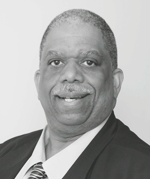Council Member Leroy Comrie, Chair of the City Council’s Land Use Committee and representative of Queens’ 27th District, is not afraid to raise his voice or make his opinion known. For the most part, however, Comrie is known as a quiet, thoughtful, and fair-minded civic leader.
Comrie was born in Jersey City, but he was raised in the same southeast Queens community he now represents. His parents, Jamaican immigrants, helped spark Comrie’s interests in politics and government. After studying political science at the University of Bridgeport, Comrie returned to Queens and became active in local government. He served simultaneously as district manager for former Council Member Archie Spigner and as president of his local school board. When term limits forced Spigner to yield his seat in Council, Comrie was elected to replace his mentor in 2001.
Becoming Chair. During his first two terms in office, Comrie was Chair of the Consumer Affairs Committee and a member of the Landmarks, Public Siting & Maritime Uses Subcommittee. He closely monitored the Zoning & Franchises Subcommittee, however, because it often involved issues that were germane to both his district and the City. After Comrie’s reelection to a third term, several colleagues asked him to replace outgoing Council Member Melinda Katz as Chair of the Land Use Committee. Comrie believes they sought him out because of his reputation for being fair, honest, and informed. Katz, who also recommended him, urged Comrie to ensure that the Committee continued to be accessible and responsive to the public’s needs.
Approaching the job. According to Comrie, the Chair’s main responsibilities are to work with the Committee’s staff to make sure that all meetings are transparent, coordinate with subcommittee chairs on their respective agendas, and make sure that all Committee members understand the issues that come before them in order to arrive at informed decisions. Noting that he has three smart and articulate subcommittee chairs, Comrie typically defers to their decisions on a matter unless they somehow overlooked critical details. Comrie also serves as a member of the Zoning & Franchises Subcommittee, which he feels informs his role as Chair because it is the most active subcommittee and is often Council’s first level of review for important planning issues.
When considering a land use application, Comrie likes to take the middle ground and consider both sides of an issue in order to arrive at an informed decision. The more controversial projects that Comrie has presided over so far have included the landmarking of the Upper West Side’s West Park Presbyterian Church and the approvals of Williamsburg’s Rose Plaza and Domino Sugar projects. During those negotiations, Comrie made sure that all sides had a full opportunity to express their opinions in detail in order to move them closer to reaching a compromise. While there will be other controversial projects, Comrie remains confident that the Committee will continue to work to find appropriate compromises.
Slow economy. Comrie admits that the economic downturn has reduced the number of applications and changed the kind of projects that the Committee reviews. While this has not altered how the Committee reviews proposals, Comrie believes the Committee should consider how it can help stimulate the economy by solving bureaucratic issues quickly and by making the land use process run more efficiently.
Council’s proper role. Comrie is concerned that many recent large-scale projects did not come before the Council, including the Atlantic Yards project. Comrie believes the Council would have ensured the correct amount of housing was included in the proposal and would have secured commitments on construction timelines. Comrie notes that the Council probably would have approved the Atlantic Yards redevelopment because there was an overwhelming desire to see affordable housing built in the area and for the Nets franchise to come to Brooklyn. Comrie also believes that bringing the issue before the Council would have created less animosity between the developer and the community by giving both sides the proper public forum to discuss their differences.
The Future. Although Comrie once considered a run for Queens Borough President, he is focused on being the best Land Use Chair possible within the current financial environment. As Comrie sees it, his constituents will keep in public service if he does his job well. And Comrie enjoys his job, calling it a “noble opportunity to have a major impact and give back to the city that raised and nurtured me.” — Matthew Windman


